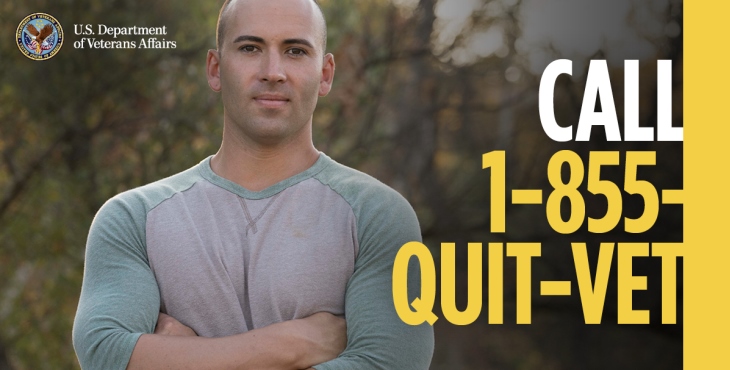There are very serious health risks associated with chewing tobacco.
There’s cancer of the mouth, and cancer of the esophagus. There’s an increased risk of heart disease, and an increased risk of having a stroke. There’s tooth decay and receding gums.
But smokeless tobacco can also pose very serious questions for your everyday life.
Does using dip keep you from enjoying or even attending important family events? Does it take up your time and occupy your thoughts? Is it a habit you don’t want your children to pick up?
Smokeless tobacco contains 30 cancer-causing chemicals — including arsenic, lead, formaldehyde, and the particularly harmful tobacco-specific nitrosamines (TSNs). The levels of those TSNs can be up to 100 times higher in smokeless tobacco than in cigarettes.
VA is working to shine a light on the effects of smokeless tobacco and provide a path forward for Veterans who are trying to quit. If you are one of those Veterans, the Great American Spit Out on Feb. 22 is a perfect day to start. This annual event encourages smokeless tobacco users to set a quit date.
We want Veterans to know we understand that there isn’t a one-size-fits-all solution for quitting smokeless tobacco. So, we offer a range of resources:
- Medication and counseling: Veterans can meet with their provider to receive medication and/or individualized or group counseling.
- Tobacco Quitline (1-855-QUIT-VET; 1-855-784-8838): This VA hotline connects Veterans with a trained counselor who can help them develop a quit plan, provide individualized counseling, and identify strategies to prevent relapse.
- SmokefreeVET: By texting “VET” to 47848, Veterans can sign up for VA’s text-message support program, which offers 24/7 encouragement, advice, and tips to help tobacco users quit for good.
- gov Quit Plan: Veterans can use the resources developed alongside Smokefree.gov to build a plan that prepares them for quitting smokeless tobacco and increases their likelihood of staying tobacco-free.
- Smokeless Tobacco: A Veterans Guide to Quitting: Veterans who use smokeless tobacco can use this free online workbook for assistance with quitting.
This February, Veterans can chart a course to a healthier life. VA stands ready to help.
For more information about tobacco cessation, visit: http://www.publichealth.va.gov/smoking/index.asp
Topics in this story
More Stories
Veteran was trained to collaborate with fellow Airmen. Having his buddy’s six was important, and still is.
It’s essential for Veterans to take action and prepare for tornados and spring storms while staying informed.
Army Veteran Jeffery Williams' journey is a testament to resilience, perseverance and the power of innovation in transforming lives.





